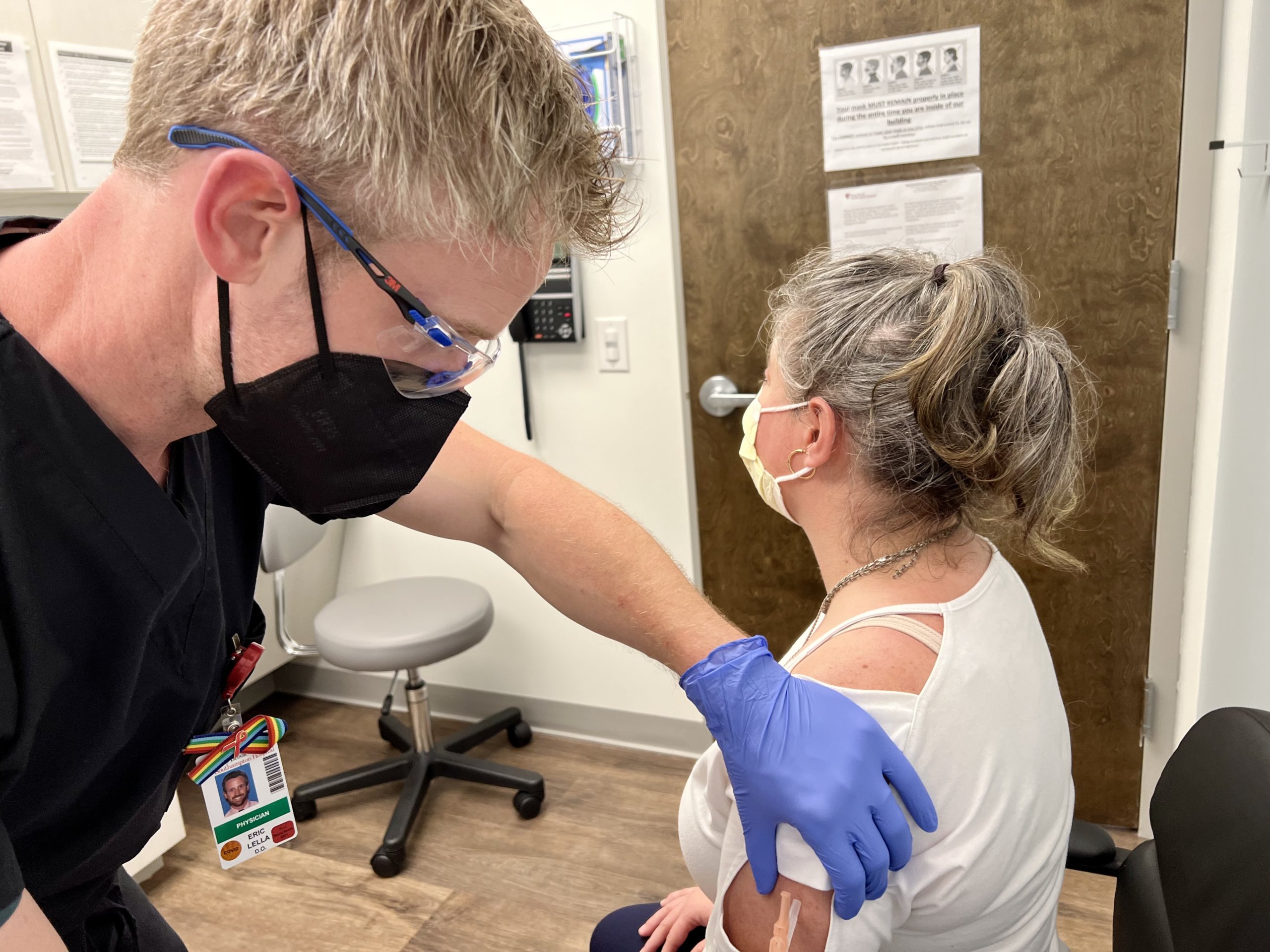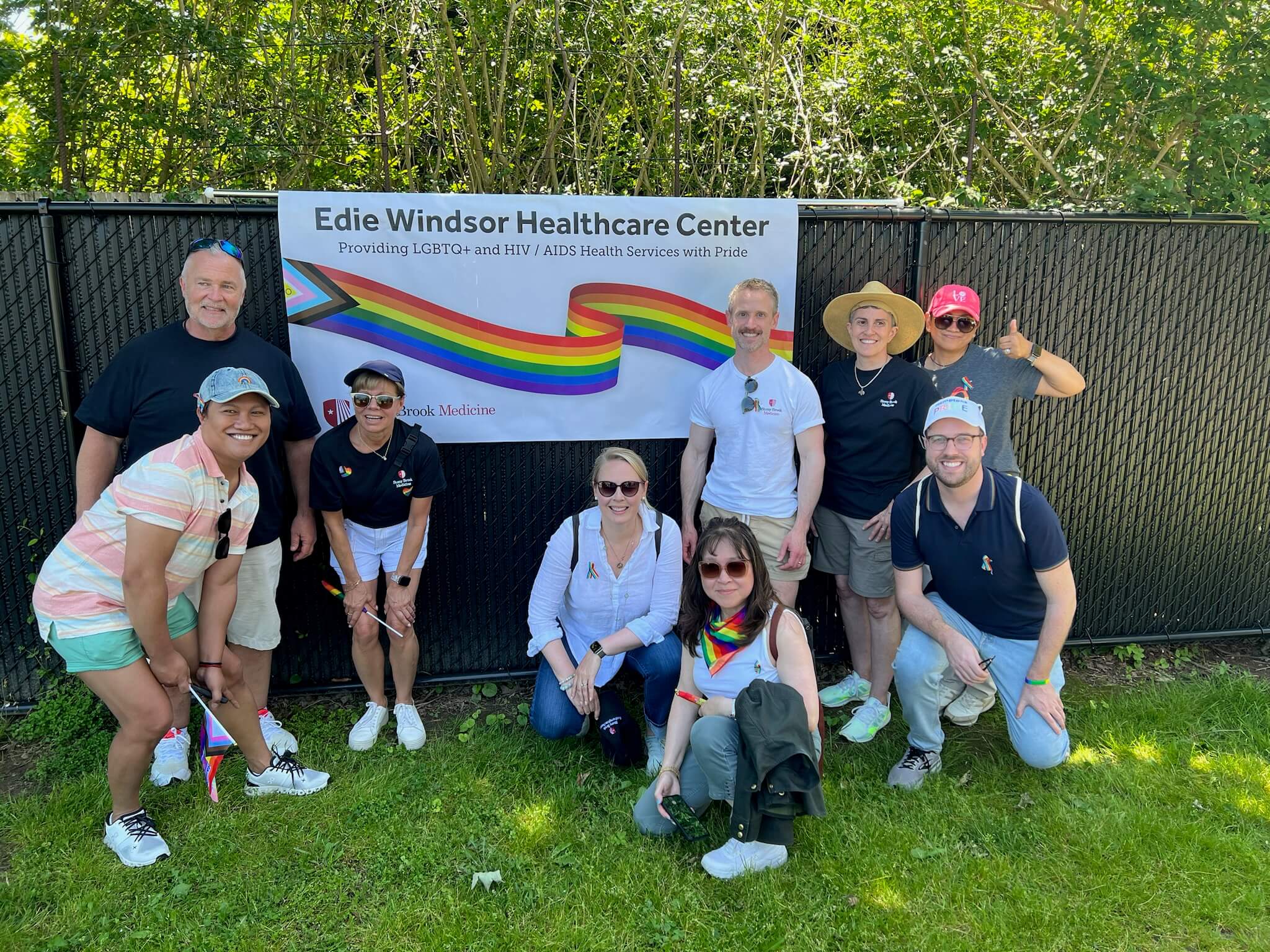Summer, Sex & STIs: Edie Windsor Healthcare Doctor Shares Ways to Party Smart This Season

LGBTQ+ Pride Month has officially begun, kicking off with the third annual Hamptons Pride Parade in East Hampton on June 1. The march concluded in Herrick Park, where Stony Brook Southampton Hospital’s Edie Windsor Healthcare Center (EWHC) staff greeted the community, handed out rainbow swag and provided essential resources informing passersby about the center’s acclaimed LGBTQ+ healthcare, STI testing and HIV/AIDS treatment through Rose Walton Care Services.
The EWHC has a full Pride Month schedule this year, bringing their invaluable resources to events all over Long Island. Find them at Patchogue Pride, sponsored by Stony Brook Medicine, on Sunday, June 9 at noon, in Patchogue Village; at the Pride at the Farm family fair, sponsored by Stony Brook Medicine, on Saturday, June 15 from 4–7 p.m. at Suffolk County Farm in Yaphank; and at the LGBT Network’s North Fork Pride parade and festival on Saturday, June 22 from noon–5 p.m. in Greenport Village.
Pride Month means that summer has begun, and summer means that a wave of handsome strangers has washed up on East End shores. Many of these fine gentlemen, ladies and enbies are looking for a whirlwind summer romance, others for a quick hookup, and it’s tempting to throw caution to the wind during this season of indulgence. However, as the EWHC’s presence at Pride reminds us, if we’re going to party hard, we need to party smart. Sexually transmitted infections (STIs) like Monkeypox and HIV are still a risk that need to be considered when choosing bedfellows, and there are a surprising number of preventative measures available locally that can greatly reduce that risk.
Dr. Eric Lella, medical director of the EWHC in Hampton Bays, is something of an expert on the topic of sexual healthcare and took the time to share his insights on STI prevention methods and the many services available to the community through the EWHC, such as primary and family medical care, hepatitis testing (A, B and C), free HIV rapid testing and free Mpox vaccinations.

A Conversation with Dr. Eric Lella
As Pride Month kicks off the summer social season, what are some ways that individuals can avoid contracting and spreading STIs like Monkeypox and HIV?
Number one, we’re going to always want patients to practice safer sex practices. That includes getting tested regularly with their healthcare provider, knowing their HIV status, being regularly screened for STIs, having open conversations with your sexual partners, and using condoms.
With monkeypox, or just Mpox, there are still numbers that exist from the original 2022 outbreak — cases still present in Suffolk County and in New York State. In the United States, the numbers are lower than that initial season, but the risk is still present. Currently, the risk for Mpox for the heterosexual population is very low, but the CDC (Centers for Disease Control and Prevention) qualifies it as a low-to-moderate risk for men who have sex with men.
Much like the COVID-19 vaccine, Mpox vaccines are not 100% effective at preventing the illness, but they do likely lead to much milder cases if there is a breakthrough infection. In May of 2024, the CDC said that the majority of cases in the United States continue to be in people who are not vaccinated at all for Mpox or who only received one dose of the JYNNEOS vaccination. We still recommend getting two full doses of the vaccine to provide maximum protection. Individuals who’ve only received one vaccination dose, regardless of how long ago or where they got that vaccine, should still get that second dose to be considered fully vaccinated. Currently, we have no recommended boosters (beyond the recommended two doses).
Most of the individuals who have received vaccinations are white, followed by Hispanic and Latino individuals, followed by Black non-Hispanic individuals, but the cases that we see — those individuals who are at highest risk and have had the highest numbers of infections — are actually the inverse of that. We have seen more cases in African American or Black individuals followed next by Hispanic or Latino individuals, then Caucasian non-Hispanic patients. That shows that we really need to be encouraging full vaccination status in all of the vulnerable populations, especially minority populations because they continue to be at higher risk. … There could be a number of factors, but the moral of the story is that we need to think about getting all of the at-risk individuals vaccinated if they like. There’s information about who is eligible based on medical history, et cetera at stonybrookmedicine.edu/Mpox/vaccinations.
As for HIV prevention, we’re always recommending diligent condom use. We want to have barrier protection, whether it’s male condoms or feminine condoms. We want to be tested often ourselves as individuals, but we want to have conversations with our sexual partners to make sure that they also know their status. That’s one massive way of reducing risk … because among patients who have gone a long time without getting an HIV test, there are a lot of individuals who have HIV and do not know it. That is a very high-risk scenario.
The goal of the state and federal government is to test as many individuals as possible to identify these unknown cases and link them to the appropriate healthcare and treatment as fast as possible. We want to get all HIV-positive individuals to undetectable viral load levels. When someone has an undetectable viral load, it is not possible for them to transmit the virus to a person who is HIV negative. That’s a concept called “U=U” (undetectable equals untransmittable). So that is a massively important component of HIV prevention — people getting tested, knowing their status, and if they are HIV positive, getting linked to care, getting on appropriate treatment and being monitored on appropriate treatment regularly to assure that their viral load is adequately suppressed and undetectable.
The other one is having a discussion with your healthcare provider about the multiple forms of medication for PrEP (pre-exposure prophylaxis) for HIV. I find that a lot of patients don’t know all the different options for PrEP. It’s not just a single simple option. It’s important to speak with a well-knowledged healthcare provider, somebody who has good knowledge about PrEP. One of the sad things is I see a lot of patients in the area who come to me from another primary care provider, who was either not up to date on their education regarding PrEP prescribing or they felt uncomfortable managing those medications. That’s a big problem. One out of three primary care providers in the United States is not aware of what PrEP is.
It’s important to get linked to somebody like the providers at the Edie Windsor Healthcare Center who are well-knowledged in this. We have two different oral forms of PrEP, and there are multiple dosing options for people with different circumstances. Even if someone thinks that they’re not at a high risk all of the time, there are still important conversations to have with their provider. There are ways to have people protected on PrEP, even if they have very infrequent discrete periods of higher-risk sexual practices or sexual encounters where they would be at a high risk of contracting HIV. We find that a lot of patients, even if their primary care is managing PrEP, haven’t gone over those other dosing options and have not heard about the long-acting injectable medication called Apretude.
That is a shot that you get at the doctor’s office every two months, and you do not have to take a daily pill. It’s shown in head-to-head studies to be slightly more effective than the oral pills. So talk to your knowledgeable healthcare provider, such as the providers at the Edie Windsor Healthcare Center, to go over the multiple different options and details about PrEP that can be tailored to everyone’s situation. … I find that a lot of patients come to me saying they have heard everything about it with their other providers, only then to find out during our conversation that they weren’t aware of all of the caveats of the different options.

How often do new PrEP options become available?
The biggest advance has been the addition of Apretude, which has been FDA-approved since December 0f 2021. We’ve been prescribing that for well over two years or so at the Edie Windsor Healthcare Center. I think we’re one of the few clinics on Long Island that’s prescribing this, and we are probably prescribing it at much higher numbers than other clinics.
There are some future options that are in studies currently, but we don’t have any other immediately upcoming options to alert the public about.
Once again, it’s important for all teenagers, adolescents and adults who are sexually active to see a well-knowledged provider to get appropriate sexually transmitted infection screenings. I find that non-LGBTQ-aligned providers often offer inadequate testing for sexually transmitted infections based on different sexual practices. It’s not always just a simple blood and urine test. Sometimes we need to perform other tests like swabs of other at-risk body sites that could have a sexually transmitted infection. I’ve had patients come to me and say, “Oh, my provider just sent me here to talk about PrEP. They just did an STI panel on me said I’m all clear.” Then I ask them if they bottom or perform oral sex … and if they’ve had any swabs done. Lo and behold, their primary care gave them the all clear, but in fact, they were not fully and adequately tested.
I’d imagine it’s difficult for most people, especially teenagers, to talk to their doctor about their sex life. How should that sensitive health topic be approached?
Your doctor should be bringing up questions about your sexual health, at least during your annual physical. That is an important visit that every patient should get. … Under the Affordable Care Act, or Obamacare, patients with insurance are entitled to one annual visit to discuss preventative healthcare and medicine, and that’s a visit where there should not be a copay.
If a healthcare provider is not bringing up the history of a patient’s sexual health and talking about that, those providers are doing their patients a disservice. At the Edie Windsor Healthcare Center, we ask all our patients, once they’ve hit puberty, if they are sexually active.
A lot of providers are very uncomfortable talking about sex with their patients, and that’s very unfortunate. It’s important that patients advocate for themselves. If they find that their provider is reluctant to talk about sexual health, that may be a signal that they may want to see a provider who is taking care of the whole person. Our sexual health is a very important component of our overall health, so it’s important that our sexual health be well fulfilled and that our doctor makes sure that everything is working right and to our fulfillment. … Unfortunately for a lot of patients, they have to bring it up to their provider on their own because the providers just aren’t that comfortable with asking it. At the Edie Windsor Healthcare Center, we aren’t shy about that. We ask about all components of an individual’s health.
It’s the same thing with STI prevention — having the conversation with your sexual partners, that’s an uncomfortable conversation. When we meet somebody new, there’s a lot of exciting energy there. The thought of talking about sexual health, testing and STI statuses can be a little bit of a buzzkill. That’s just not something that anybody wants to throw into the mix, but it’s so important for your own health. If your partner is someone who’s reluctant to talk about sexual health with you and about getting regular screenings, that may be a signal that this person doesn’t have your best interests in mind. You should be sexually active with somebody who respects your health, let alone their own health.
In addition to the things that we’ve discussed so far, what treatments or services are offered at the EWHC?
We have full comprehensive primary care. We do HIV treatment and prevention, full sexual healthcare screenings and treatment for patients. If patients have issues or lack coverage from insurances, we work around that. We have a dedicated staff member who will help patients get linked to eligible programs, whether they be state or federally funded insurance programs … or the best program available to them through the marketplace. (Patient Navigator Camille Limongelli) is going to handle those things and get our patients covered. There are a number of different options, so it’s important that we get patients set up with that.
We do gender-affirming hormone therapy. We have a referral system to a broad network of LGBTQ+ specific medical specialists within the entire Stony Brook Medicine system; that includes surgeons, endocrinologists, a nutritionist, OBGYN care, speech therapy (voice training) for transgender individuals, many important referrals to different staff specially trained to be affirming and well-knowledged about the needs of the LGBTQ+ community.
We have a robust mental health services program through our licensed social worker, Ann Marie, LCSW-R, and we are starting a group therapy. She does individual in-person and telemedicine therapy sessions with patients and has years of experience working with LGBTQ+ patients for talk therapy. Our patients absolutely love her. She’s great! She’s setting up a number of different group therapy sessions, some of them for transgender individuals, and there’s going to be more groups coming in the upcoming months.
We have a psychiatrist on staff, and we get patients linked to behavioral health as soon as they request it. We get a behavioral health intake packet that gets reviewed, and we get patients linked to care for that. That’s for the patients of our clinic, the HIV patients, our PrEP patients and our primary care patients.
We do same-day sick visits and primary care for the whole family — from pediatrics to adults to geriatric patients. We also offer telehealth visits if it’s applicable for the patient’s concern.
Care to share any closing thoughts?
Pride month is more than just parties and flags. Of course, we want to celebrate the pride and accomplishments of the LGBTQ+ community, but it’s also an important time to remember that … there are people in the United States and in the world who still believe that they’re better off dead than being themselves. That’s why visibility is so important to those individuals who find themselves in a situation where they don’t feel that they can be open and be themselves. That’s what Pride is for — to lift those people up and help them realize that things do get better, and that we have services to support them.
The Edie Windsor Healthcare Center is located at 182 West Montauk Highway, Building B, Suite D, Hampton Bays. Office hours are Monday through Friday, 8 a.m.–4 p.m. They have bilingual English and Spanish language staff. For more information about programs, services and donations to the Edie Windsor Healthcare Center, visit southampton.stonybrookmedicine.edu/services/LGBTQ-and-HIV-healthcare.
For Monkeypox vaccine updates and availability, visit npin.cdc.gov/web-tools/Mpox-vaccine-locator and stonybrookmedicine.edu/Mpox/vaccinations.



